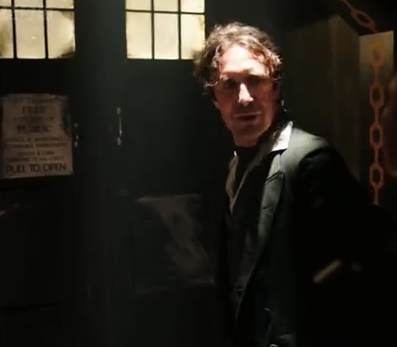The Cultural Lives of Doctor Who: “The Night of the Doctor”
The opening scene is familiar to any Who-fan: sparks flying, a ship moments from crashing, the word “Doctor” perking ears up. The companion – ever distressed and female – is unsurprised at the sudden arrival of a mystery man and, quickly quipping, proves herself worthy of traveling with the Doctor. All standard Doctor Who fare – until the T.A.R.D.I.S. comes into view, and the would-be companion pulls away. She would rather defiantly die in an explosion than step aboard the ship of a war-crazed Time Lord.
As Matt Hills points out, “The Day of the Doctor” has relied heavily on social media to establish the importance of this event, so it’s no surprise that showrunner Steven Moffat is making use of YouTube to hype the episode. Yet “The Night of the Doctor” has so much more importance than just setting the stage for what is quite possibly the largest simulcast event the world has seen. Though just under 7-minutes long, this short nonetheless marks an important addition to the Doctor Who universe, answering longstanding questions and shaking up canonical knowledge in one go.
Despite the brevity of his onscreen tenure, the Eighth Doctor lived on for years in the extended Who Universe; he served as the Doctor in the Doctor Who Magazine comic strip for 9 years, appeared in 73 spin-off novels, and is featured in numerous BigFish Production audio dramas. The adventures he’s had and the friendships that have been developed are beloved among fans of the extended universe. Yet, the relevance of these stories to the main television canon has long been in question. So when the Eighth Doctor, facing regeneration, says “Charley, C’rizz, Lucie, Tamsin, Molly… friends, companions I’ve known, I salute you,” he does more than pay tribute to their contribution to his adventures. This line cements the existence of these characters in the official canon of Doctor Who, legitimating years of production work and ensuring that Paul McGann’s addition isn’t just limited to an hour-and-a-half TV movie.
Most obviously, the short illuminates an unknown part of the Doctor’s personal timeline: the circumstances around the Eighth Doctor’s regeneration. It had been previously presumed to lead directly into Christopher Eccleston’s run as the Ninth Doctor, but we see that McGann instead transforms into John Hurt. Hurt’s involvement in “The Day of the Doctor” has been official for awhile. Indeed, he appears at the very end of “The Name of the Doctor,” with the tag “Introducing John Hurt as The Doctor.”
His role, however, was not known for certain, and fan rumors abounded about whether he was a Future or Past Doctor, or an older incarnation of the Eighth Doctor himself. The revelation that he’s an in-between Doctor has disrupted the significantly important numbering system used to differentiate the Doctors – which has, in fact, been used throughout this very article to differentiate Paul McGann’s Doctor from the rest. If McGann was the Eighth Doctor, is Hurt the Ninth? Do all the Doctors move up, so Eccleston is now the Tenth, Tennant is the Eleventh (losing the nice symmetry between ten and Tennant)?
Many fans find this form of retconning disruptive to the core of Doctor Who (though as one fan pointed out to me, can a show about time travel ever really be considered retconned?). Conscious of the disruptive effect, Moffat has addressed the issue in Doctor Who Magazine, issue #467, stating that “He’s very specific, the John Hurt Doctor, that he doesn’t take the name of the Doctor. He doesn’t call himself that. He’s the same Time Lord, the same being as the Doctors either side of him, but he’s the one who says, ‘I’m not the Doctor.’ So the Eleventh Doctor is still the Eleventh Doctor, the Tenth Doctor is still the Tenth…”
Yet “The Name of the Doctor” specifically introduces Hurt as “The Doctor.” This identification is changed to “The War Doctor” in “The Night of the Doctor,” so perhaps the adjective is enough to preserve the canonical numbering system. Whether or not this change violates the spirit of the Who mythos is still up in the air – and probably won’t come down until after “The Day of the Doctor” airs on November 25th. Keen fans anticipate yet another YouTube release; listings for additional “The Day of the Doctor” material have popped up online, hinting at a soon-to-be-released four-minute video called “The Last Day.” In the meantime, theories abound, and whatever happens on “The Day of the Doctor” is certain to dramatically alter the future – and the past – of Doctor Who.
This is the fourth post in The Cultural Lives of Doctor Who, Antenna’s series commemorating the television franchise’s fiftieth anniversary and its lasting cultural legacy. You can read Matt Hills’ inaugural post about multi-Doctor specials here, Keara Goin’s post about the Doctor’s female companions here, and Derek Kompare’s post about the gaps in the series’ history here. Stay tuned for new posts in the series most every Tuesday throughout the remaining weeks of 2013.






Nitpick alert. Its “Big Finish,” not “Big Fish.” Also: “The revelation that he’s an in-between Doctor has disrupted the significantly important numbering system…” Why is this “significantly important?” I suppose the disruption can be seen as important, but as Moffat says, The Doctor doesn’t go around calling himself “the 11th Doctor.” The disruption also seems part of a significant and important larger plan. Since the Doctor has “12 regenerations” (stated in 1976’s “The Deadly Assassin”), and with the addition if Hurt’s #9 and Tennant’s diverted metacrisis regen, Smith is… 13, or the end of the road. That this has been snuck into the story is pretty fun, and helps to confuse things even more, which is good! The show needs surprises, and especially ones that come at the expense of “significantly important” yet unexamined bits of lore.